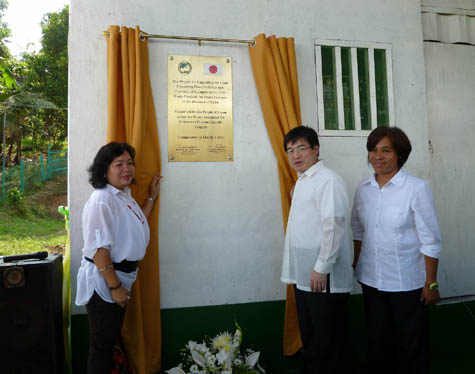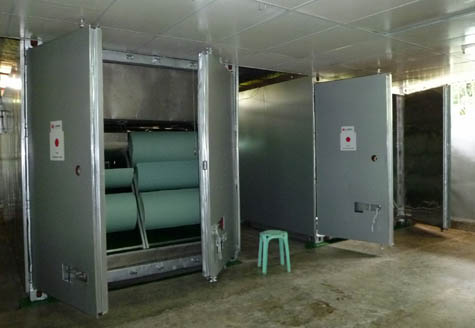Minister Akio Isomata, Minister for Economic Affairs of the Embassy of Japan attended the turnover ceremony of “The Project for Upgrading the Food Processing Plant Facilities and Provision of Equipment for Fair Trade Product for Small Farmers in the Province of Cebu,” on March 4, 2011 in Naga City, Cebu. The project, amounting to US$93,910 (approximately 4.3 million pesos), is funded through the Grant Assistance for Grassroots Human Security Projects (GGP). The ceremony was witnessed by Ms. Geraldine Labradores of Southern Partners and Fair Trade Center, Inc. as well as representatives from partner organizations and farmers groups.
Mango production is traditionally famous in Cebu Province. Mango export is a major contributor to the country's foreign exchange reserves, with about 20 foreign countries importing both fresh and processed mango from the Philippines. The annual revenue of the Philippines from the mango industry amounts to approximately 14 million dollars. On the other hand, small mango farmers, who are directly involved in mango production, have not fully benefited from the scale of the industry.
To cope with various problems the small farmers are facing, the Southern Partners and Fair Trade Center, Inc. (SPFTC) established a fruit processing plant in Naga City, Cebu to serve as a direct link between producers and consumers. The SPFTC advances the fair trade practice by purchasing farm products at fair prices, and delivers quality products to consumers. Their activities have contributed to income increase of small farmers. However, due to the limited capacity of the processing plant they own, only limited amounts of fruit used to be processed per day.
With the grant assistance, the SPFTC has purchased a new fruit dehydrator that has a larger capacity and two burner stoves that can also contribute to the improvement of productivity. A hauling truck has also been provided under the grant in order to pick up harvested fruit and deliver their products. To improve the hygiene and sanitary condition of the plant, new stainless steel basins and cooking vats, etc. have also been purchased, and part of the plant have also been renovated, such as roof insulation setting, drainage setting, and floor tiling. This project will improve the efficiency and productivity of the SPFTC-owned plant and, therefore, contribute to income increase of about 450 small farmers.
In his speech, Minister Isomata expressed Japan’s sincere hope that, through this project, farmers would be able to earn better and improve their livelihood prospects, which also leads to a greater economic development in the area. He also said that this project would be another testimony and milestone of the friendship between the peoples of the Philippines and Japan, which further fosters a strategic partnership between our two countries towards the future.
Japan, as the top donor of the official development assistance for the Philippines, launched GGP in the country in 1989 for the purpose of reducing poverty and helping various communities engaged in grassroots activities. As of early March 2011, 440 grassroots projects funded by GGP – ranging from roughly 1 to 4 million pesos – have been implemented by NGOs, local government units and other non-profit organizations. The total grant for these projects so far amounts to US$19,745,127. It is expected that this project will further contribute to strengthening the friendly ties between the peoples of Japan and the Philippines as well as fostering a strategic partnership between the two countries towards the future.
Speech of Minister Akio Isomata
Japanese Version



